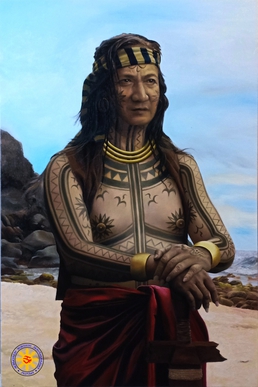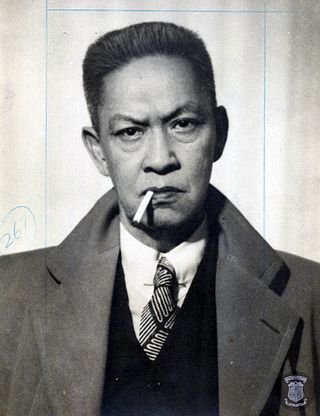
Camarines Norte, officially the Province of Camarines Norte, is a province in the Philippines located in the Bicol Region in Luzon. Its capital is Daet. The province borders Quezon to the west, Camarines Sur to the south, and the Philippine Sea to the north. It has historically been a Bikol-speaking region. However, there has been a language shift in recent years to Tagalog, which is more commonly used nowadays.

Lapulapu or Lapu-Lapu, whose name was first recorded as Çilapulapu, was a datu (chief) of Mactan in the Visayas in the Philippines.

Enrique of Malacca, was a Malay member of the Magellan expedition that completed the first circumnavigation of the world in 1519–1522. He was acquired as a slave by the Portuguese explorer Ferdinand Magellan in 1511 at the age of 14 years, probably in the early stages of the capture of Malacca. Although Magellan's will calls him "a native of Malacca", Antonio Pigafetta states that he was a native of Sumatra, Indonesia. Magellan later took him to Europe, where he accompanied the circumnavigation expedition in 1519. According to some historians, it is possible that he could be the first person to circumnavigate the globe and return to his starting point, however, there is no record or source that confirms it.
Uldarico Aguilar Alviola Sr. was a Filipino Visayan civil servant, novelist, and editor from Cebu, Philippines. While he wrote in English and Spanish, his published works in the Cebuano language earned him the title "Dean of Cebuano Writers."

Vicente Castelo Sotto III, professionally known as Tito Sotto, is a Filipino politician, entertainer and athlete who served as Senate President from 2018 to 2022. Before that, he had two stints each as Senate Majority Leader and Senate Minority Leader. He served a total of four terms in the Senate: 1992 to 2004 and 2010 to 2022, tying the record for the longest-serving Senator with Lorenzo Tañada and Franklin Drilon. In between his stints in the Senate, he led the Dangerous Drugs Board for a year. He became the Vice Mayor of Quezon City from 1988 to 1992, and later unsuccessfully ran for vice president in the 2022 elections as Panfilo Lacson's running mate.

Vicente Yap Sotto was a Filipino playwright, journalist, and politician who served as a Senator from 1946 to 1950. He also served in the House of Representatives from 1922 to 1925, representing Cebu's 2nd district. He was the main author of the Press Freedom Law.
Cebuano literature includes both the oral and written literary forms Cebuano of colonial, pre-colonial and post-colonial Philippines.
Cebuano theater refers to the theater arts of the Cebuano people and those conducted in the Cebuano language. It also refers to contemporary productions and adaptations produced in Cebu City.
Gen. Inocencio Junquera Huergo y Sánchez was a civil and political governor of Cebu, Philippines, from 1893 – 1895. He left a legacy to Cebuano culture by establishing the Teatro Junquera, the most important theater of Cebu in the late 19th and early 20th centuries.

The Republic of Zamboanga was a short-lived revolutionary government, founded by General Vicente Álvarez and the Zamboangueño Revolutionary Forces after the Spanish government in Zamboanga, Philippines officially surrendered and ceded Real Fuerte de Nuestra Señora La Virgen del Pilar de Zaragoza in May 1899. On May 28, 1899, Álvarez declared the territory's independence from the Spanish Empire, and became the republic's first and only genuinely elected president.

General Vicente Álvarez y Solís was a Zamboangueño revolutionary general who led the revolution in Zamboanga which forced the surrender of the last Spanish Governor-General of the Philippines, Diego de los Rios, effectively ending the Spanish occupation in the Philippines.
Espiridiona Bonifacio y de Castro was a Filipino Katipunera. She was one of the first female members of Confederation established by her older brother Andres Bonifacio. The others were her older brothers Ciriaco and Procopio Bonifacio.

Vicente Rama was a Filipino Visayan legislator, publisher, and writer from Cebu, Philippines. Recognized as the Father of Cebu City, he authored the bill for its cityhood which was approved into law by October 20, 1936. He also founded the leading pre-war Cebuano periodical, Bag-ong Kusog.
Vicente Ranudo was a Filipino Visayan writer, poet laureate, and Cebu provincial civil servant. He wrote for various pre-war periodicals, including the first Cebuano newspaper Ang Suga, and was considered the father of Cebuano poetry.
Amando Navarette Osório (1890–1946) was a Filipino Visayan poet, playwright, novelist, and Cebu deputy governor. His novel Daylinda, Ang Walay Palad was the first historical fiction in Cebuano literature and the third novel written in Cebuano language.

Manuel Cabahug Briones was Filipino Visayan lawyer, judge, and politician from Cebu, Philippines. He was the first Supreme Court Associate Justice from Cebu, and he was a former Associate Justice of the Court of Appeals, two-term Senator, Member of the House of Representative for four consecutive terms, and editor from Cebu, Philippines.
Buenaventura Perez Rodriguez was a playwright, the governor of Cebu, Philippines from 1937 until 1940, and a member of the House of Representatives for two terms. He was the first Cebu governor of the Philippine Commonwealth.
Filemón Sotto was a Filipino Visayan lawyer, legislator, and politician from Cebu, Philippines. He was a newspaper publisher and founded the periodicals El Imperial, Ang Kaluwasan, La Opinion, and La Revolucion. He served as member of Cebu municipal board, congressman of Cebu's 3rd district for the Philippine Assembly (1907–1916), senator of the Philippine Legislature (1916–1922), delegate to the 1934 Constitutional Convention, and delegate to the Institute of National Language (1937).
Vicente Arandia Gullas was a Filipino writer, lawyer, and educator from Cebu, Philippines. Founder of the Visayan Institute, he introduced innovation in educational system through the establishment of working student and study-now-pay-later schemes and of satellite schools to allow students from locations outside Cebu City. In 2019, he was hailed as one of the top 100 Cebuano personalities.








